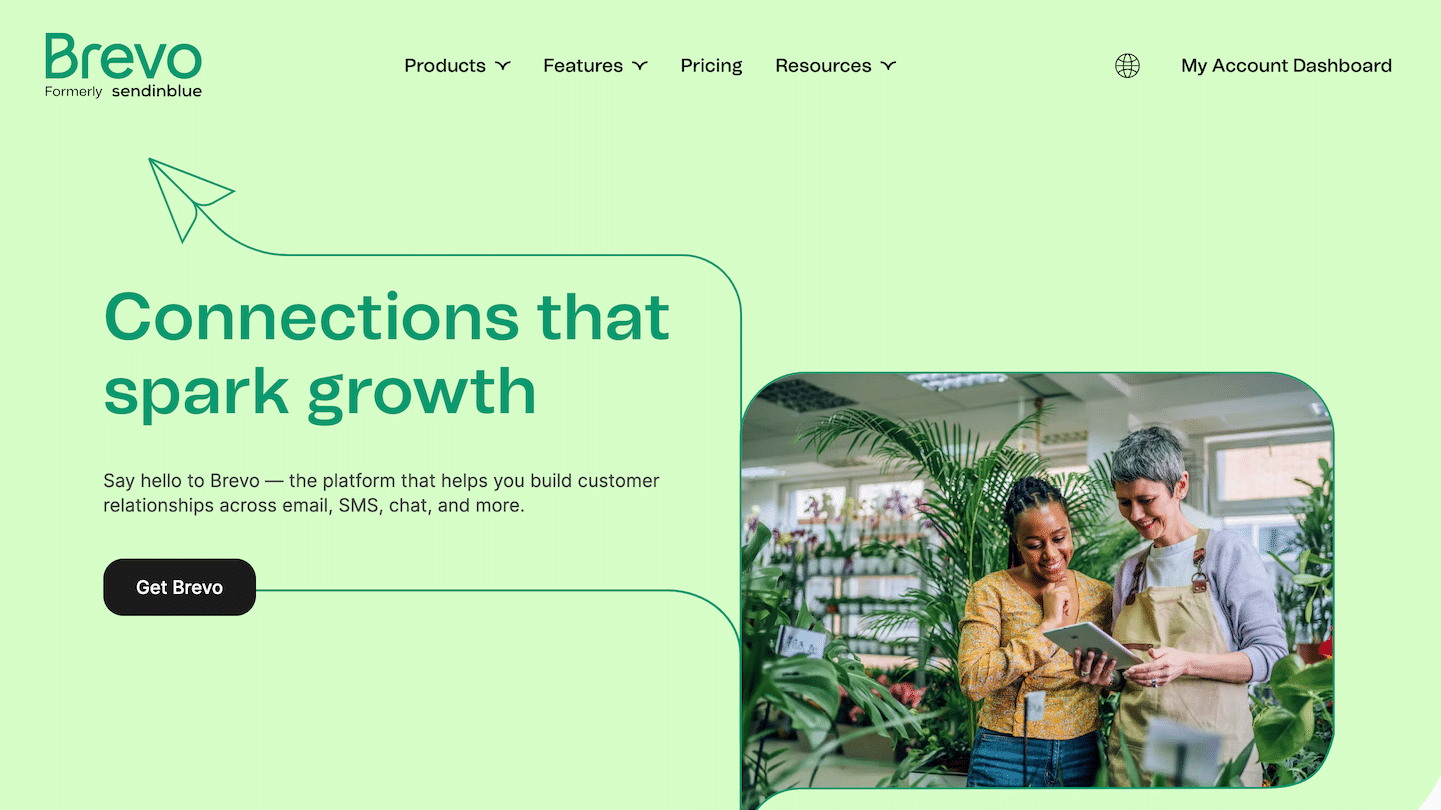For a long time, customer reviews were a subject reserved for B2C. To say that things have changed since then would be an understatement!
In B2B, the mechanics have changed: prospects are looking for proof. And in a landscape where offers look alike and multiply, customer reviews have become one of the main points of reference for your potential customers.
The success of platforms such as Capterra, G2 or Truspilot, which we consult very closely when writing reviews of B2B software, illustrates the importance of customer reviews. And therefore the importance of “Review Management”, i.e. the art and art of collecting, managing and exploiting customer reviews.
In this article, we show you how to move from simple review management to a real review management strategy, and which tools to choose to transform your customer feedback into a reputation and revenue gas pedal.
Sommaire
First of all, what is Review Management?
Review management is the set of practices and tools used to collect, moderate, analyze and distribute customer reviews. “Review” is the accepted term for customer reviews.
Review Management comprises several stages:
- Collection, which covers all methods of soliciting hot or cold feedback, via email, in-app, form, third-party review platform or structured interview.
- Moderation, which involves verification, the fight against false reviews and the application of clear rules on publication.
- Analysis, which adds depth to verbatims through segmentation, scoring and the extraction of recurring themes useful to teams.
- Dissemination: bringing social proof to life where it really influences the buying journey. These include product pages, specialized comparison sites, sales presentations and nurturing campaigns.

In B2C, the volume of reviews and visibility often take precedence, as decisions are made quickly and are highly sensitive to social signals. In B2B, the focus shifts to quality, the accuracy of use cases and the credibility of the author.
| Criteria | B2C approach | B2B approach |
|---|---|---|
| Target | Rapid visibility and large-scale conversion | Validate choice, reduce risk and prove ROI |
| Review format | Rating and short commentary | Detailed testimonials, case studies, impact metrics |
| Weight of an opinion | Low unit impact, mass effect | High unit impact, professional credibility |
| Role in the cycle | Immediate discovery and reassurance | Qualification, due diligence, speeding up negotiations |
Why Review Management has become strategic in B2B
B2B buyers are increasingly informed like consumers, but their decisions involve budgets, teams and deadlines.
In this context, a detailed customer review acts as proof of value, reducing uncertainty and speeding up decision-making. It also prepares the ground ahead of the first sales meeting and increases the quality of leads that reach sales.

Well-exploited reviews act as a qualification filter. A prospect who has read a customer case study close to his situation already understands the value proposition, implementation constraints and expected results. This translates downstream into fewer basic objections, more technical exchanges and a shorter sales cycle.
Integrated with CRM and automation tools, review management becomes a key component of RevOps. Signals from reviews feed scoring, help detect churn risk, and identify ambassador customers for upsells or sector referrals. It’s actionable data for marketing, sales and customer success.
In economic terms, social proof reduces acquisition costs and improves conversion rates at every stage. It reinforces credibility in calls for tender, secures the short-list and saves negotiation time. At scale, this mechanism translates into greater sales velocity and a more predictable sales pipeline.
Review management should also be seen as a reusable editorial asset. Testimonials, quotes, case studies and aggregated notes can feed your product pages, nurturing sequences, sales proposals and pre-sales materials.
Going further
- Read our article on How to get good customer reviews (and why)?
- 20 examples of satisfaction survey emails analyzed in detail to maximize your review collection rates
Implementing an effective B2B review management strategy
#1 Choose the right customers at the right time
The secret of good review management is relevance. You don’t need an avalanche of reviews, but targeted testimonials from customers able to illustrate the value of your solution in specific contexts.
Identify your most satisfied customers, those who have achieved concrete results, or the “power users” who make full use of your product. Their feedback will be rich, credible and meaningful for your future prospects.
The time of collection is just as decisive. Soliciting advice at the wrong time (too early…or too late) often leads to lukewarm or incomplete feedback.
Ideally, you should wait for a positive milestone: a successful go-live, an objective achieved, a strategic milestone reached… If you’re using a CRM such as HubSpot or Salesforce, you can automate these mailings through defined triggers, whether it’s the closing of a completed project or the receipt of a high satisfaction rating.
#2 Vary collection formats
In B2B, content quality takes precedence over quantity. Rather than multiplying forms, opt for formats that make it easier for your customers to speak up.
A short, well-designed questionnaire is often enough to obtain interesting verbatims, but you can also go a step further by conducting a 15-minute interview, which you then write up in the form of a testimonial, to be validated by the customer. This “assisted” format provides much richer feedback, while making life easier for your contacts.
Think about collaborative testimonials too: you write an article or case study with your customer, which they can then share on their own channels. It’s a win-win approach: your customer adds value to their project, and you get credible, concrete and authentic content to reuse in your marketing materials.
#3 Integrate customer reviews into your CRM ecosystem
Review management takes on its full meaning when connected to your business tools. By integrating your reviews into your CRM, you create a virtuous loop: data from customer feedback feeds your dashboards, refines your scoring and guides your sales priorities.
You can, for example, identify ambassador accounts, spot weak signals of dissatisfaction or track satisfaction by segment.
Many review management solutions (such as Reviewflowz, Avis Vérifiés or Guest Suite) offer bidirectional integration. Quite simply, this means that your reviews can automatically trigger actions: a notification to a sales rep, a reactivation campaign or a customer reference request.
#4 Make the most of your customer reviews
A customer review only has an impact if it’s visible in the right place. Publishing detailed testimonials on your product pages, case studies or sales proposals is an excellent way of reinforcing the credibility of your message.
Don’t neglect external distribution either. Evaluation platforms such as G2, Capterra and Trustpilot have become an essential part of the B2B purchasing process. Many decision-makers consult them before even contacting a sales rep.
Being present, highly rated and active on these platforms boosts your visibility and credibility. You can even synchronize your reviews with your Google Ads campaigns or landing pages to maximize the impact on conversion.
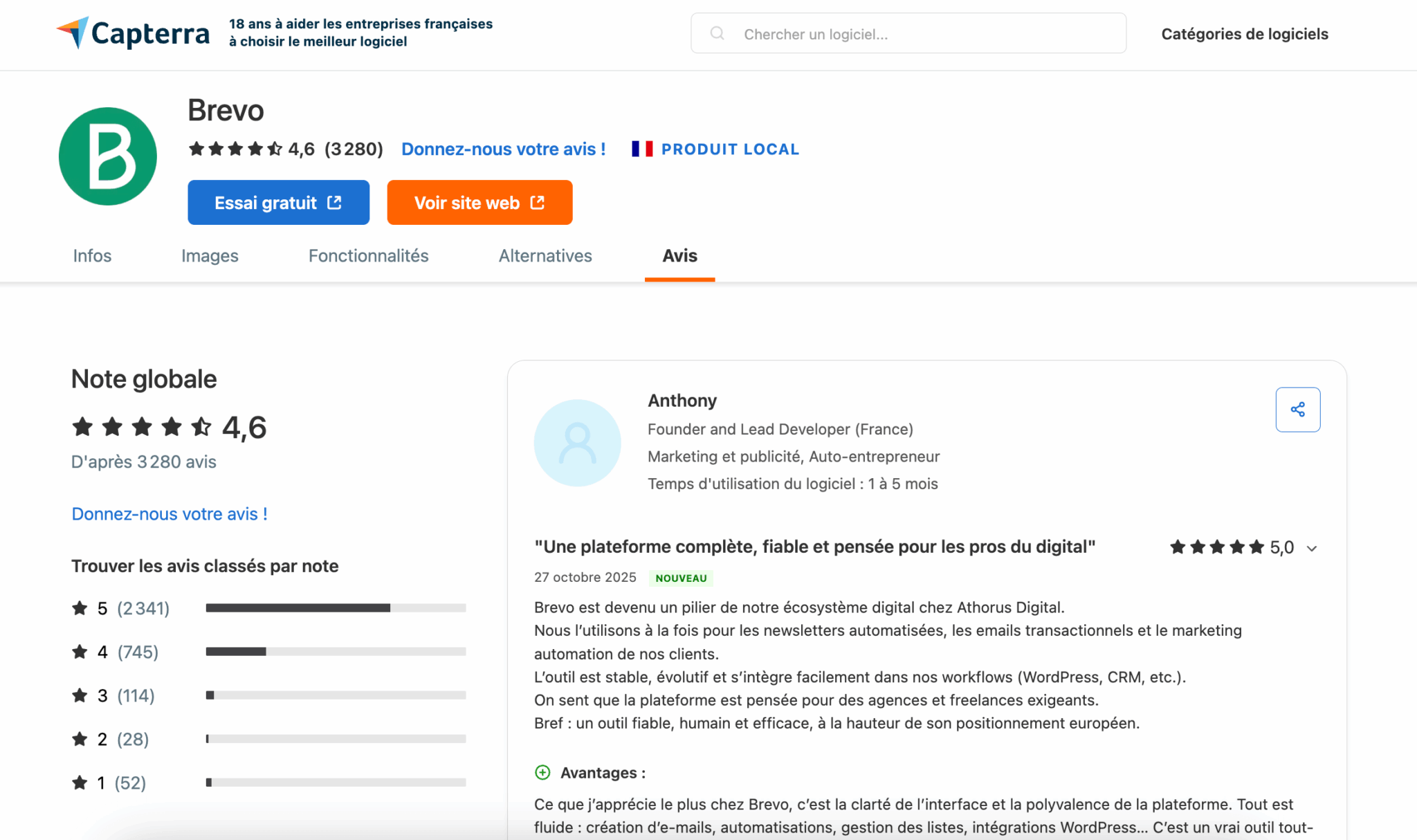
Above all, make sure your message is consistent. Your marketing promises, case studies and customer feedback all need to tell the same story. A genuine customer testimonial is better than a sales pitch: it proves by example the value you bring.
#5 Measure, adjust and capitalize
Like any marketing or sales strategy, review management requires follow-up. Good indicators are not just quantitative.
Yes, the number of reviews counts, but what matters most is their quality, freshness and breakdown by segment. You can track the response rate, the proportion of positive reviews, the frequency of updates, as well as the correlation between customer satisfaction and sales performance (renewals, upsells, conversions).
Learn to value negative reviews too. An unhappy customer can be a valuable source of learning. By responding with professionalism and empathy, you prove your responsiveness and your ability to improve. These interactions, often public, reinforce your credibility. And in some cases, they can even help you win back a customer.
Finally, use feedback to fuel your decisions. If several customers raise the same request or point to a recurring difficulty in use, this is a strong signal for your product roadmap or support strategy. Review management then becomes a real customer intelligence tool, at the service of all your teams.
The best review management tools for B2B
#1 Trustpilot: The global benchmark for visibility and credibility
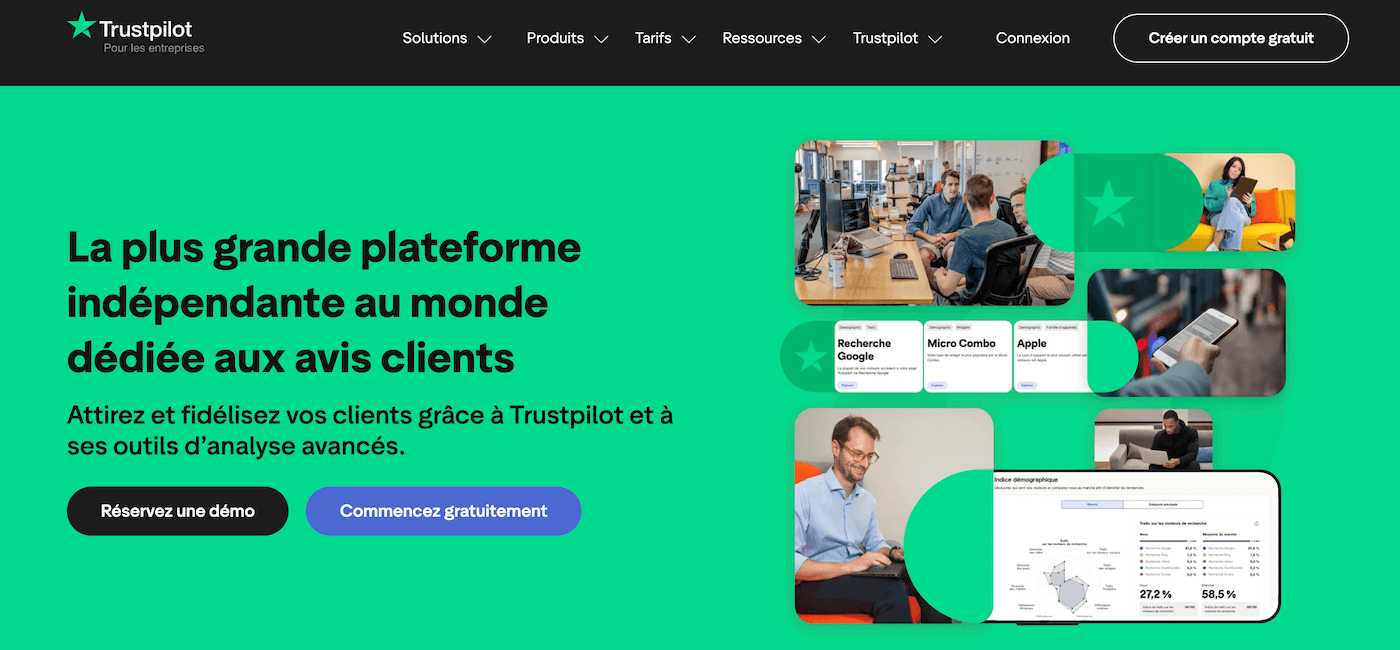
It’s impossible to talk about review management without mentioning Trustpilot. This tool has established itself as an international standard, and its reputation inspires confidence in buyers and partners alike. In B2B, it’s a formidable platform for boosting your brand’s credibility and optimizing your SEO thanks to the distribution of reviews on Google and search engines.
Trustpilot lets you automate your review collection from your CRM (Salesforce, HubSpot) or emailing tools. You can also create custom widgets to display your best reviews on your site. Its centralized dashboard helps you track trends and measure satisfaction by product, market or customer typology.
Plans start at $299 per month, a price that reflects the power of the brand and the richness of its integrations. It’s a wise choice if you’re looking to boost your international visibility while maintaining a high level of reliability and control.
Who is Trustpilot for?
B2B companies who want to maximize their online visibility and display a globally recognized label.
#2 Verified Reviews by Skeepers: The French champion
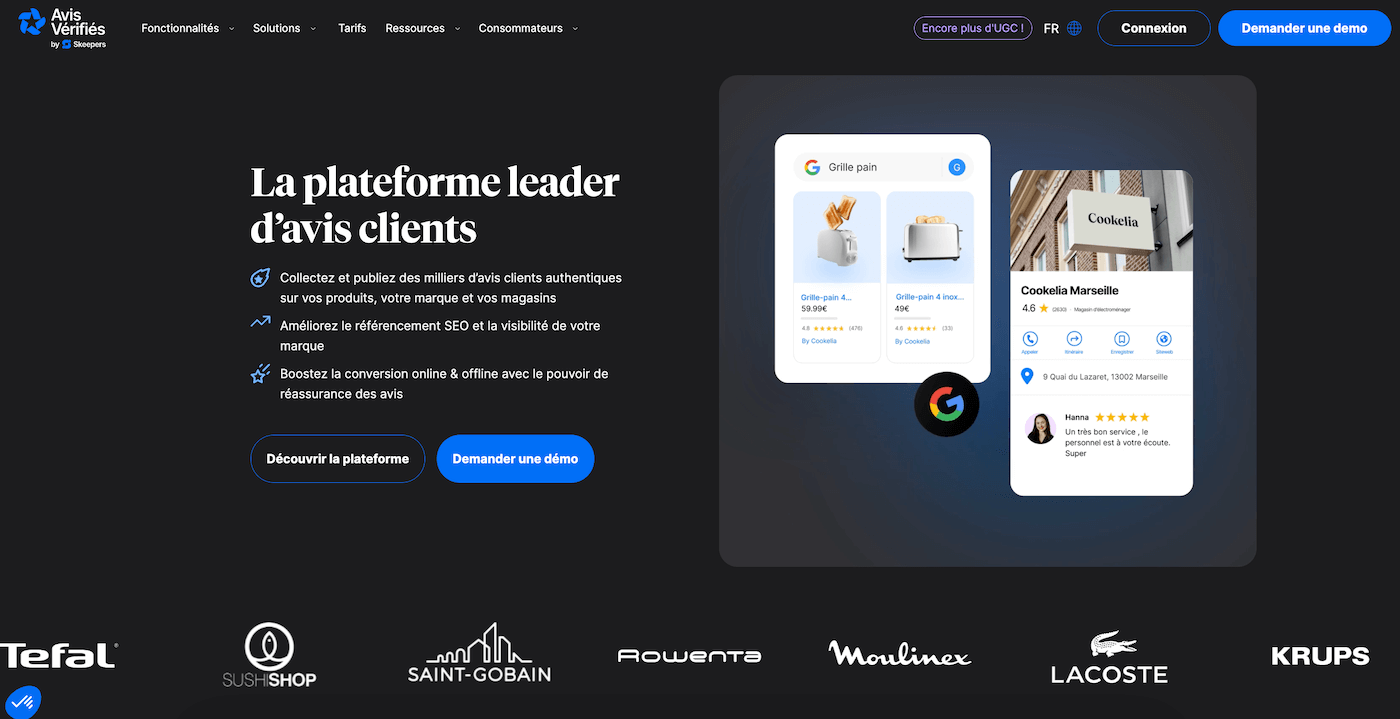
Verified Reviews is undoubtedly the most recognized solution in France for guaranteeing the authenticity of customer feedback. Certified AFNOR NF Z74-501, it offers total transparency in the collection, moderation and publication of reviews. It’s the perfect solution for B2B companies wishing to reconcile marketing performance with regulatory compliance.
The tool enables you to personalize your post-purchase questionnaires, analyze feedback in real time and automate their distribution on Google, your site or your product sheets. Avis Vérifiés also uses artificial intelligence to classify verbatims, spot weak signals and detect opportunities for improvement.
With offers starting from €35 per month, it’s excellent value for money for French SMEs and ETIs. Several major groups have already adopted it, including Total Energies and Decathlon Pro, to manage their customer satisfaction in a centralized, structured way.
Who is Verified Reviews for?
Companies that want to increase transparency, reassure prospects and prove the reliability of their reviews, while remaining compliant with French standards.
#3 Reviewflowz : The tool for SaaS and scale-ups
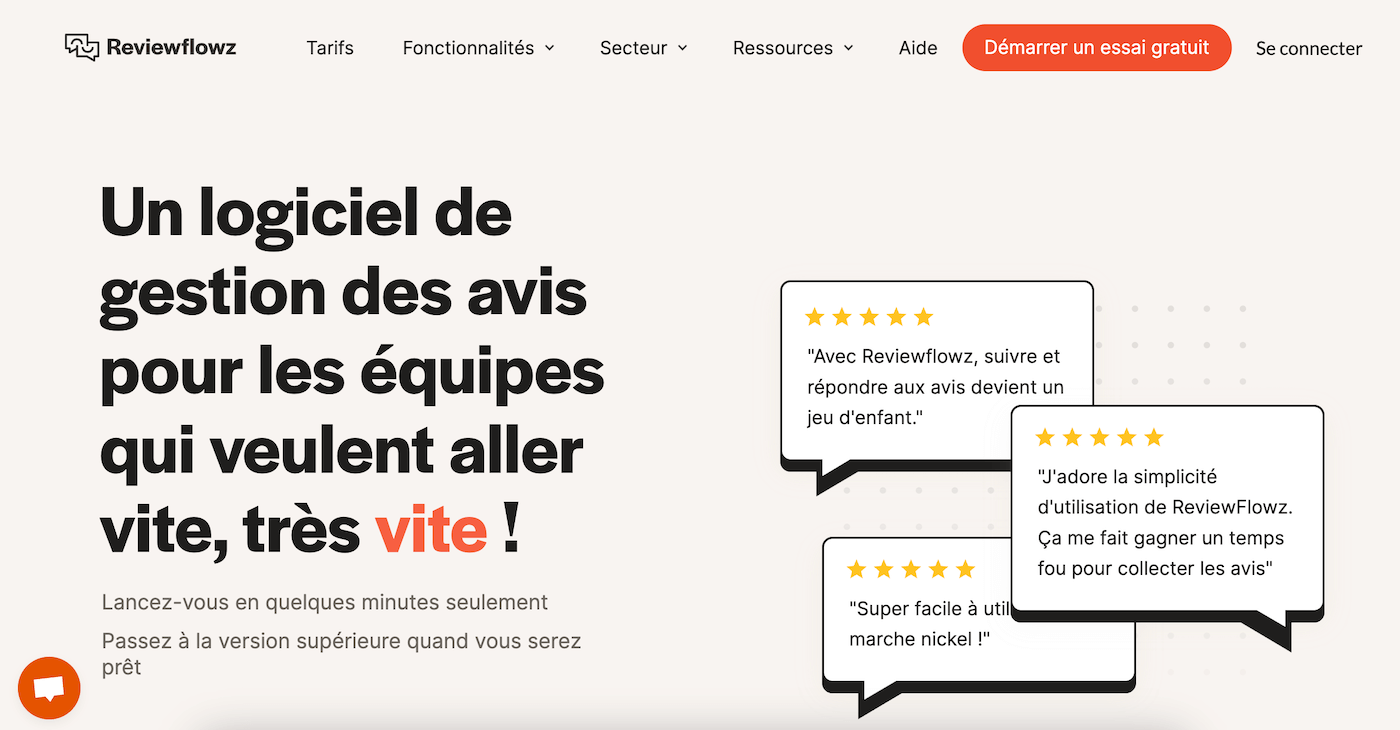
Founded by Axel Lavergne, co-founder of Salesdorado (yes, that’s right!), Reviewflowz is primarily aimed at software publishers and SaaS companies. It’s a lightweight, modern tool designed to automate the management of reviews on platforms such as G2, Capterra or TrustRadius. It helps you collect, track and analyze product reviews, without weighing down your technical stack.
One of Reviewflowz’s greatest assets is its integration with the tools you already use: Slack, Teams, Zapier, Webhooks, HubSpot…
You can receive new reviews in real time, react directly from your internal channels and track the evolution of your reputation on key comparators. The tool also provides sentiment analysis and trend reports to better understand how your product is perceived in the marketplace.
Reviewflowz rates are designed to adapt to the size and maturity of your business. The model is based on the number of review profiles tracked: the Lite plan starts at around $12 per profile per month (or about $60 for 5 profiles).
For structures requiring API access or massive data exploitation, a customized plan is available on request.
Who is Reviewflowz designed for?
B2B software publishers, start-ups and scale-ups who want to automate the management of their reviews on G2, Capterra and other SaaS market comparators.
#4 Guest Suite: The ideal solution for multi-site companies
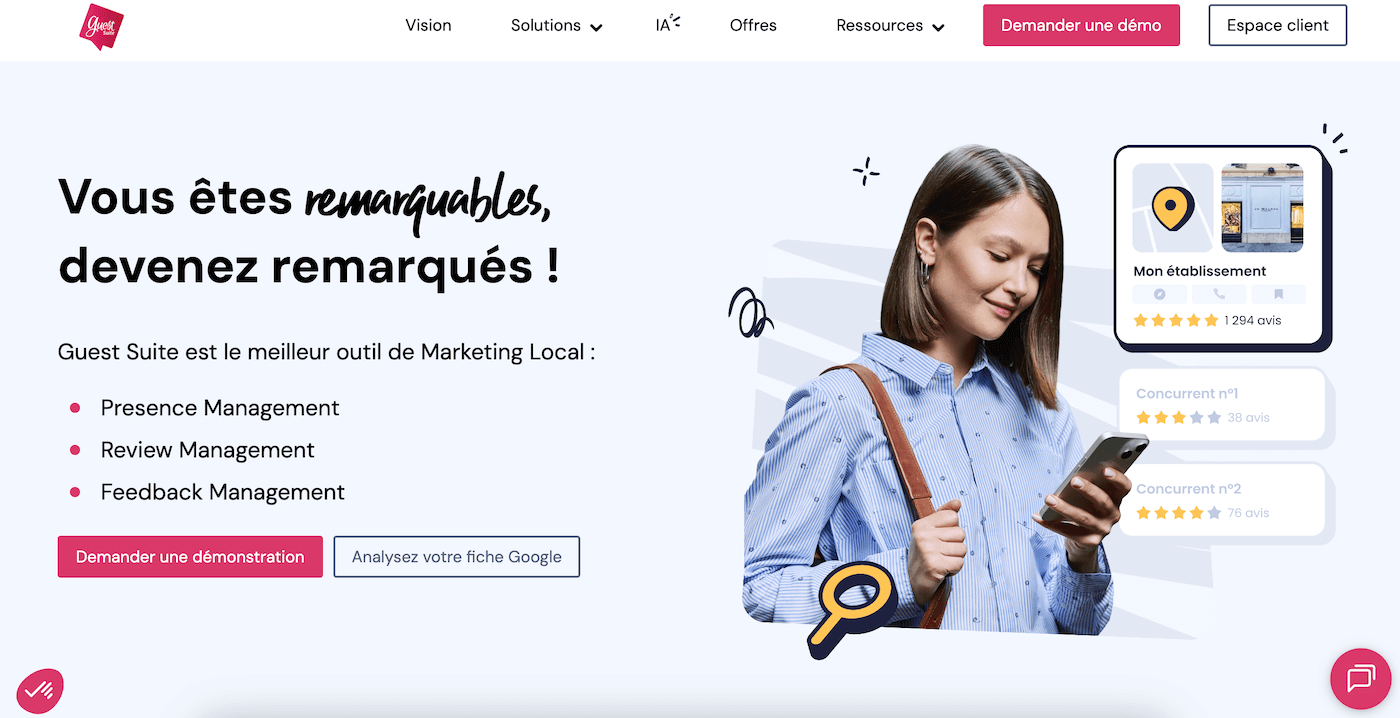
If you manage a network of agencies, sales outlets or regional offices, Guest Suite is probably the solution for you. The tool has been designed to centralize the management of reviews on several establishments, while improving your local visibility on Google Business Profile. It is particularly appreciated by service companies, banks and B2B networks with a strong local presence.
Guest Suite lets you personalize your questionnaires, choose the right moment to solicit feedback, and automatically distribute feedback to your key platforms. You can track results by agency, by region or globally, thanks to a simple, visual dashboard. The team also offers support in implementing the strategy and tracking satisfaction.
Rates vary according to network size and number of locations, but remain competitive. It’s a complete solution for managing the reputation of several entities while maintaining brand consistency.
Who is Guest Suite for?
Agency networks, franchises or B2B groups who want to professionalize their review management and optimize their local presence on Google.
#5 Custplace: The French SaaS solution for the customer experience
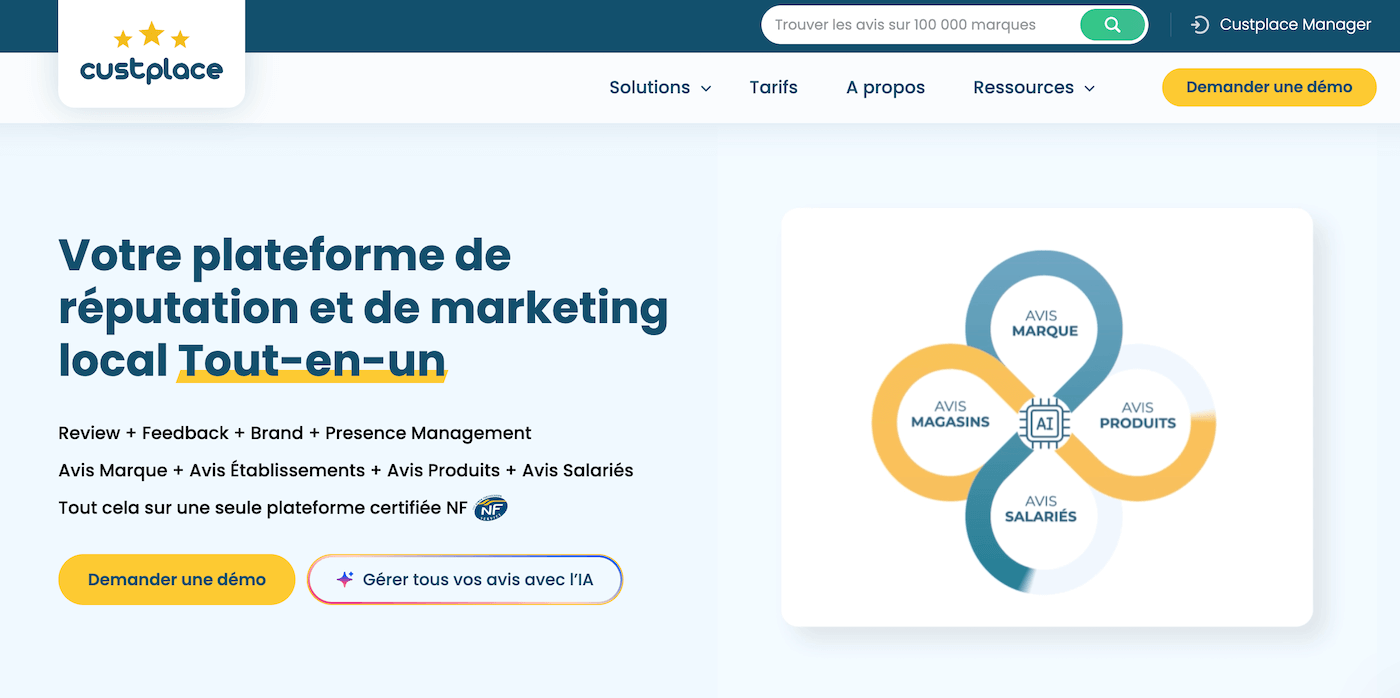
Custplace takes a more global approach to review management, combining reputation management and customer experience enhancement. The platform centralizes your reviews collected from various channels (Google, Facebook, partner sites, internal surveys) and provides you with rich, customizable dashboards.
Features include moderation, semantic analysis, segmentation and automated publishing. You can filter your feedback by product, channel or customer. Custplace integrates with most CRM and automation tools on the market, making it easy to synchronize data between your marketing, sales and support teams.
Rates start at €100 excl. tax per month for SMEs. What sets Custplace apart is the quality of its support: the team helps to structure the e-reputation strategy and to professionalize responses to reviews, a real asset for structures wishing to mature.
Who is Custplace for?
B2B companies looking to centralize the management of their customer returns, with expert support and a 100% French solution.



